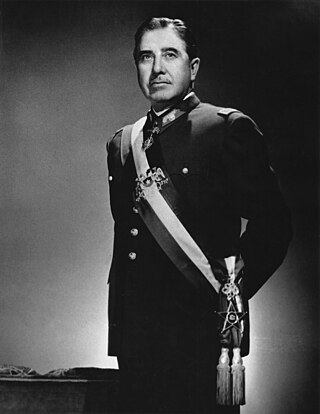Related Research Articles

Recreate for Growth was a centre-right political party in Argentina, principally active in the Province of Buenos Aires.
Presidential elections were held in Chile on 4 September 1946. The result was a victory for Gabriel González Videla of the Radical Party, who received 40% of the popular vote and 75% of the Congressional vote.

Republican Proposal, usually referred to by its abbreviation PRO, is a political party in Argentina. PRO was formed as an electoral alliance in 2005, but was transformed into a national party in 2010. It is the major component of the Juntos por el Cambio coalition, and its leader is former Argentine president Mauricio Macri, who is the party's president since May 2024.

Republicanism in Spain is a political position and movement that believes Spain should be a republic.
Vente Venezuela is a political movement in Venezuela headquartered in the city of Caracas. It has parliamentary representation in the National Assembly. Its registration as a political party has not been granted by the National Electoral Council.

Democratic Left of Catalonia was a political party in Catalonia (Spain). EDC was founded in 1975 as the Catalan Liberal Party, and ideologically it defined itself as "radical liberal" and federalist. It was merged into Democratic Convergence of Catalonia (CDC) on 27 June 1978.

Political Evolution, also known in Spanish by its shorthand Evópoli, is a Chilean centre-right political party, founded in 2012. The party defines itself as a liberal platform for the people who look for a "modern centre-right who proposes as the central axis of their proposal the appreciation of diversity, the emphasis on encouraging local communities and the pursuit of social justice".

The National Union Movement was a Chilean political party that supported the military dictatorship of General Augusto Pinochet, founded on 27 November 1983 by Andrés Allamand, Francisco Bulnes Sanfuentes, Pedro Ibáñez Ojeda and other former members and supporters of the National Party, the Radical Democracy and Christian Democrats expelled from the party. Many members of the National Union Movement occupied public offices and important positions during that regime. The referent defined itself as independent, conservative and liberal.

National Advance was a Chilean far-right political party of nationalist ideology who supported the military regime led by Augusto Pinochet. They had party legal existence between January 1988 and July 1991.

The Liberal Democrat Party of Chile was a Chilean political party that had legal existence from 1988 until 1989 under the state of "in formation".
The Liberal-Republican Union was a Chilean right-wing political party founded in December 1987 from the merger of the Liberal and Republican parties. Its president was Hugo Zepeda Barrios and its secretary general was Gabriel Leon Echaíz.

The Democratic Alliance was a Chilean political coalition existing between 1983 and 1988 that was composed of political parties and organisations that opposed the military regime led by Augusto Pinochet.
The Liberal Party or Liberal Movement was a Chilean classical liberal political party that existed between 1983 and 1987, with an opposition stance to the military dictatorship led by Augusto Pinochet.

José Antonio Kast Rist, also known by his initials JAK, is a Chilean lawyer and politician. Kast ran for president in 2021, winning the first round and losing in the second round run-off to Gabriel Boric.
The Republican Party is a right-wing populist and conservative political party in Chile. Its founder and former leader is Chilean presidential candidate José Antonio Kast.

Pinochetism is an authoritarian and personalistic political ideology rooted in the military dictatorship led in Chile between 1973 and 1990 by Augusto Pinochet. Ranging from the right-wing to the far-right, Pinochetism is characterised by its anti-communism, conservatism, militarism, and nationalism. Under Pinochet, Chile's economy was placed under the control of a group of Chilean economists known collectively as the Chicago Boys, whose policies have been described by some as neoliberal. Former and current supporters of the dictatorship are known as pinochetistas.
References
- ↑ Patricio Aylwin. "El reencuentro de los demócratas: del golpe al triunfo del no". Memoria Chilena (in Spanish). Retrieved 13 July 2016.
- ↑ Tomás Moulián. "La reorganización de los partidos de la derecha entre 1983 y 1988" (PDF) (in Spanish). Retrieved 24 June 2016.
- ↑ "La oposición chilena se congrega entorno a Valdés". ABC (in Spanish). 8 August 1983. Retrieved 24 June 2016.
- ↑ "Alianza Democrática (1983-1987)". Memoria Chilena (in Spanish). Retrieved 13 July 2016.